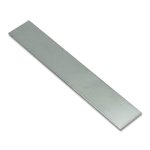-17%
Electrode -Zinc Plate
Original price was: KSh 680.00.KSh 564.00Current price is: KSh 564.00.
- Zinc Plate Electrode: Conducts well, reacts readily in electrochemistry (anode).
- Good for electroplating (deposits metals), sacrificial protection (protects other metals from corrosion), and some batteries.
- Advantages: Versatile, affordable, relatively safe, good sacrificial properties.
- Description
- Reviews (0)
Description
Electrode -Zinc Plate
An electrode-zinc plate is a conductive plate made from zinc, offering a combination of useful properties for various applications. Here’s a detailed description of its functionalities, applications, and considerations:
Functionality:
- Good Conductivity: Zinc offers good electrical conductivity, making it suitable for various electrical applications. While not as conductive as copper, it surpasses aluminum.
- Electrochemical Properties: Zinc readily participates in electrochemical reactions, making it a valuable electrode material in electrochemistry. It acts as an anode (positive electrode) and dissolves easily, releasing electrons.
- Corrosion Resistance: Zinc offers good corrosion resistance in some environments, particularly when it forms a protective zinc oxide layer.
Applications:
Zinc plate electrodes find use in a variety of applications due to their conductivity and electrochemical properties:
- Electrochemistry: Widely used as an anode in electroplating processes to deposit other metals like copper, nickel, or silver. Zinc ions dissolve from the anode, allowing the desired metal to be plated on the cathode.
- Sacrificial Anodes: Zinc plates are commonly used as sacrificial anodes in cathodic protection systems. Here, the zinc plate corrodes preferentially to protect a more valuable metal structure from corrosion. This is often used to protect pipelines, underground storage tanks, and ship hulls.
- Metal-Air Batteries: Zinc is a common anode material in some types of metal-air batteries, such as zinc-air batteries used in hearing aids.
- Dry Cell Batteries: Zinc is historically used as the anode material in some dry cell batteries (e.g., Leclanché cell), although other materials are becoming more common.
Benefits:
- Versatility: Zinc plates have applications in both electrochemistry and corrosion protection due to their good conductivity and sacrificial properties.
- Cost-Effective: Zinc is a relatively inexpensive metal, making it an attractive option for various applications.
- Relatively Safe: Compared to some other electrode materials, zinc poses a lower health risk.
- Sacrificial Protection: Zinc’s ability to corrode preferentially makes it ideal for protecting valuable metal structures from corrosion.






















Reviews
There are no reviews yet.